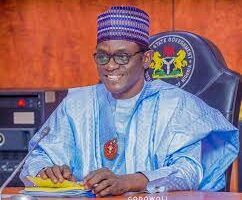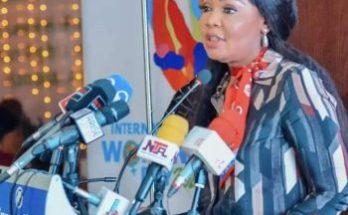…Severe cash crunch, protracted petrol scarcity major factors – CSO
…Citizens afraid of perceived electoral violence – Lawson
…Voter turnout could’ve been overstated in the past – Analyst
‘…Time to end voter apathy is now’
Since its return to democratic rule in 1999, Nigeria has enjoyed uninterrupted civilian governance for 24 years. BENJAMIN SAMSON in this report examines the low voter turnout in the February 25 presidential and national assembly polls and seeks what was responsible for that.
According to the figures released by the Independent National Electoral Commission (INEC), up to 93 million people registered to vote and 87 million collected permanent voter cards (PVCs) ahead of the elections. However, only 24.9 million Nigerians voted.
Africa
According to the figures by the International Institute for Democracy and Electoral Assistance in 2019, Rwanda recorded a turnout of 98.2 per cent in its presidential election in 2017, the highest with Kenya (79.5 per cent), Liberia (75.2 per cent), Sierra Leone (84.2 per cent), and Seychelles (90.1 per cent) also making it to the top 10 in the continent. Voter turnout in Ghana’s presidential elections between 2000 and 2016 ranged between 61.74 per cent and 85.12 per cent.
In a chat with our reporter, the director of the Centre for Democracy and Development (CDD), Idayat Hassan, said the low participation might be due to the failure of democracy to deliver development.
She said, “The failure of democracy to deliver development has made many to not have interest in participating in elections. Violence and voter suppression also played a huge role in diminishing voter turnout.
“The fact that a significant percentage of Nigerians fail to engage in elections is a concern and perhaps points to growing disillusionment with their ability to shape a more democratic society.
“The frustrations that millions of Nigerians express disappointment with governance on and off the media, in the streets and in their quiet spaces did not translate into higher voter turnout. It is sad and disappointing.
“The turnout this year is the worst on record, coming ironically in a year the election saw unprecedented anticipation and enthusiasm. Nigeria’s population has continued to increase every year, same as the population of those eligible to vote. In the 24 years of this current democratic rule, registered voters have increased by over 60 per cent from 57.9 million in 1999 to 93.5 million in 2023. However, while 30.3 million Nigerians came out to vote in 1999, there were five million fewer voters this year (2023). It makes no sense.
“Political parties had five months to campaign and sell both their manifestos and candidates to Nigerians, but the outcome of this election suggests they either failed to inspire trust in the electorate or the people just were not passionate enough to come out and vote.”
Also, commenting on the development, the chairman, Coalition against Bad Governance, Toyin Abdulkareem, said: “In the build-up to the elections, a combination of a severe cash crunch as well as a protracted scarcity of petrol, ensured Nigerians, particularly the youth, picked a strong interest in participating in the 2023 elections. But the voter turnout was abysmal, the lowest since Nigeria’s independence. In 36 states, less than half of the eligible population turned out to vote, and no state had a turnout above 40 per cent.
“In the three largest states based on voter registration; Lagos, Kano and Rivers, less than a third of the eligible population voted. The turnout in Rivers was a shameful 15.6 per cent, the lowest in the country, despite producing a lot more votes in past elections.
“Overall, the national turnout was 29 per cent; no election had a lower participation rate in the six decades of Nigeria’s independence. Of the 93.4 million registered voters this year, 87.2 million people collected their permanent voter cards and the total number of actual voters on election day was only 24.9 million. Barely, nine million people voted for President-elect Bola Tinubu who will now govern 220 million Nigerians.”
Logistics
Similarly, some analysts attributed the late arrival of INEC’s officials, thuggery, voter suppression and violence as some of the reasons for the low turnout.
In his view, the executive director, Centre for Public Accountability, Jumoke Lawson, said: “INEC materials arrived at 2:00pm in my polling unit in Port Harcourt, with officials leaving two hours later.
“Consequently, many people were disenfranchised for no fault of theirs. So, it is really difficult to assess voter turnout based on what happened on February 25.
“The view that their votes do not really count, that the outcome of most elections are pre-determined, that the electoral process is replete with violence, that the political class is undeserving of its time because of their perceived insincerity to electoral promises, consistent failure of political parties and candidates to deliver on their promises could also be responsible for voter apathy.
“However, it is a costly mistake to abstain from voting on the fear that one’s favoured candidate might not win. In a democracy, every validly cast vote counts and winners are bound to take the views of the minority into consideration in running public offices.”
Technology
However, a political analyst, Taiwo Adejare, noted that the voter turnout could have been overstated in the past, adding that technology had exposed past flaws.
“No matter how poorly organised the recent presidential and national assembly elections were, the truth is that technology has shown us that votes were probably inflated in several parts of the country. I am sure things will get better by next general elections.
“Ahead of the 2023 elections, Nigerians even got more disillusioned, hopeless about the current state of things in the country and lacked the enthusiasm to turn out for elections. Nigerians are disappointed that the government seems not to understand the hardship faced by the common Nigerian. Just before the elections, Nigerians were treated to another round of hardship having to grapple with the Naira swap policy, intermittent fuel scarcity, insecurity epitomised by cases of kidnapping, and killing, armed robberies. The woes of the country were evidenced by the continued exit of Nigerians, especially professionals, in what is now popularly called Japa.
“Nigerians should have channelled this displeasure at the present situation by turning out en masse on the day of the election to vote for candidates that will engender the desired turnaround. Moreover, elections offer an opportunity for Nigerians to change leadership that they are displeased with and vote in the one they believe will deliver,” he said.
Youths
On the other hand, the director, Activists for Good Governance, Declan Ihehaire, berated the youth for not turning up to vote despite complaints about bad governance from them on social media.
He said: “Over the years, the pictures on election days have been those of adults, elderly people queuing up under the sun for hours waiting to cast their vote. Many political analysts have wondered why the youth, in spite of their vibrancy, continue to exhibit apathy towards trooping out on election day to vote. The worry was that youths, on election day, play football in the streets, sit in front of their television sets to watch films or stay at home playing games.
“In today’s digital world, the tendency is for the youths to stay online, engage in social interactions from start to close of polls on election day. Consistently, many called for a change in this trend towards the youth actually taking the lead and being the majority at polling units on election day.
“Consequently, the youth made a bold statement about their keenness to participate in the 2023 general elections as that population led from the first week of the first quarter of the continuous voter registration (CVR) exercise. It was not a fluke as out of a total of 9,518,756 valid newly registered voters, 7,286,871, representing 76.56 per cent, were youth between age 18 and 34 years.
The chairman of the Independent National Electoral Commission (INEC), Prof. Mahmood Yakubu, in his address at Chatham House, London, clearly said the 2023 general elections are for the young people. The statistics from INEC showed that out of the 93.4 million registered voters, 70.4 million are young people between the ages of 18 and 49 years.
Continuing, he said: “Going by the statistics, the youth are expected to be the decider of the ongoing elections. In recognition of the power of the youth, with many on social media, several of the presidential candidates used social media to drive their campaigns. Electoral battles continue to be fought on social media by supporters of the various presidential candidates. The charge from stakeholders is that the youth shift the battle from social media to going to polling units on Election Day to cast their ballot.
“But in spite of the various measures and increased calls for participation, the turnout in this election has even taken a further downward trend.
“They complained in private and in public, but on the day their voices could finally be heard, they responded with graveyard silence. This was the implication of staying away from the polls; silence. Not even the country’s vibrant young population that approached this election with a lot of energy could show up and deliver numbers that sent a message that Nigerians truly were ready and willing to take charge of their own destinies.
“I acknowledge that there were challenges in the conduct of this election, some of which may have affected voters’ turnout. They include possible suppression and disenfranchisement of voters through a range of means from logistical issues to threats of violence, but the response of voters to this election pales disproportionately to the enthusiasm that heralded the casting of ballots.
“This begs the question, was it all noise? Did Nigerians really not mean all their agitations to elect new leadership through voting that would have shown they cared about those that would occupy offices?
“The frustrations that millions of Nigerians have continued to express on and off the media, on the streets and in their quiet spaces did not translate into higher voter turnout. It is sad and disappointing.”
Path to toe
Speaking on the way forward, Adejare said: “One way to boost the confidence of voters and consequently increase their turnout rate is to earn and build their trust in the electoral process. That cannot happen without transparency and impartiality by three key institutions of the government: the electoral body, INEC, the military (police, army, etc) and the judiciary.
“However, the executive branch of the government, headed by the president, wields significant power over these bodies. Therefore, to achieve fairness, the incumbency powers of the president must be reduced because the president is either on the ballot seeking re-election, or his party’s candidate is.”
Likewise, Lawson said: “We believe that voter apathy must finally be addressed in Nigeria as it continues to de-empower the average Nigerian, while empowering those responsible for their misery. For every Nigerian who is eligible to vote, but fails to discharge this civic duty, it would give an undeserving politician a better chance of securing ‘electoral victory.’
“If all that matters is winning by majority votes, then for the unworthy politician, the fewer people that actually show up to vote, the better for them. Unless Nigerians want to continue being at the mercy of bad leadership, then the time to end voter apathy is now. The presidential and national assembly elections may have come and gone, but it is not too late.
“Complacency at this time could be fatal. Indeed, low turnouts and indifference by a majority of eligible voters since 1999 have left the country in the hands of predatory, incompetent, and corrupt politicians, and sundry rent takers, thereby giving democracy a bad name.”
Ms. Hassan of CDD called on INEC to improve its election management and embark on a voter register audit, saying, “Nigeria doesn’t have a voter register audit, an audit that takes out those who have died and all other ineligible voters from the system.”




